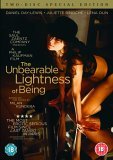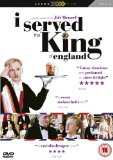![The Unbearable Lightness Of Being [1987]](/pictures/1019116.jpg) The Unbearable Lightness Of Being | DVD | (28/06/2013)
from £19.75
| Saving you £-1.76 (N/A%)
| RRP
The Unbearable Lightness Of Being | DVD | (28/06/2013)
from £19.75
| Saving you £-1.76 (N/A%)
| RRP Daniel Day-Lewis stars as Tomas, the happily irresponsible Czech lover of Milan Kundera's novel, which is set in Prague just before and during the Soviet invasion in 1968. Lena Olin and Juliette Binoche are the two vastly different women who occupy his attention and to some extent represent different sides of his values and personality. In any case, the character's decision to flee Russian tanks with one of them--and then return--has profound consequences on his life. Directed by Philip Kaufman, this rich, erotic, fascinating character study with allegorical overtones is a touchstone for many filmgoers. Several key sequences--such as Olin wearing a bowler hat and writhing most attractively--linger in the memory, while Kaufman's assured sense of the story inspires superb performances all around. --Tom Keogh
![Fortress of War [DVD]](/pictures/1108678.jpg) Fortress of War | DVD | (05/09/2011)
from £6.31
| Saving you £9.68 (153.41%)
| RRP
Fortress of War | DVD | (05/09/2011)
from £6.31
| Saving you £9.68 (153.41%)
| RRP In 1999 a British mine clearance engineer working for the Taliban government in Afghanistan must flee the country when he becomes embroiled in a deadly game of intrigue and betrayal.
![Ultimate 5-Movie Shark Collection [DVD]](/pictures/1147936.jpg) Ultimate 5-Movie Shark Collection | DVD | (17/04/2019)
from £16.98
| Saving you £N/A (N/A%)
| RRP
Ultimate 5-Movie Shark Collection | DVD | (17/04/2019)
from £16.98
| Saving you £N/A (N/A%)
| RRP From prehistoric beasts and grotesque mutations, to jaw-crunching man-eaters and aggressive artic alphas, get more bite than you bargained for from the mother of all predators. Throughout five spine tingling splatter-fests, the ferocious killing machines wreak havoc across the globe, proving evil has one BIG appetite and will stop at nothing to dominate the food chain. The ULTIMATE 5-MOVIE SHARK COLLECTION is five times as deadly, five times as razor sharp and five times as unforgettable! Included the following five films: RAIDERS OF THE LOST SHARK 3-HEADED SHARK ATTACK PLANET OF THE SHARKS ICE SHARKS JURASSIC SHARKS
![Little Otik [2000]](/pictures/1019168.jpg) Little Otik | DVD | (16/06/2003)
from £N/A
| Saving you £N/A (N/A%)
| RRP
Little Otik | DVD | (16/06/2003)
from £N/A
| Saving you £N/A (N/A%)
| RRP Based on a Czech folk tale Jan Svankmajer's most accessible film is the story of Karel and Bozena a married couple who long to have a baby. Whilst digging up an tree stump Karel decides to carve the roots into the image of a child; when his melancholy childless wife sees it her love brings the wooden form to life...
 The Lovejoy Collection - Vol. 2 | DVD | (21/02/2005)
from £10.88
| Saving you £2.11 (19.39%)
| RRP
The Lovejoy Collection - Vol. 2 | DVD | (21/02/2005)
from £10.88
| Saving you £2.11 (19.39%)
| RRP Ian McShane stars as lovable rogue antiques dealer Lovejoy in three 55 minute episodes: Friends Romans & Enemies The Judas Pair and To Sleep No More.
 Unbearable Lightness Of Being - 2 Disc Special Edition | DVD | (27/03/2006)
from £N/A
| Saving you £N/A (N/A%)
| RRP
Unbearable Lightness Of Being - 2 Disc Special Edition | DVD | (27/03/2006)
from £N/A
| Saving you £N/A (N/A%)
| RRP Daniel Day-Lewis stars as Tomas, the happily irresponsible Czech lover of Milan Kundera's novel, which is set in Prague just before and during the Soviet invasion in 1968. Lena Olin and Juliette Binoche are the two vastly different women who occupy his attention and to some extent represent different sides of his values and personality. In any case, the character's decision to flee Russian tanks with one of them--and then return--has profound consequences on his life. Directed by Philip Kaufman, this rich, erotic, fascinating character study with allegorical overtones is a touchstone for many filmgoers. Several key sequences--such as Olin wearing a bowler hat and writhing most attractively--linger in the memory, while Kaufman's assured sense of the story inspires superb performances all around. --Tom Keogh
![Three Wishes for Cinderella [Blu-ray] [Region A & B & C]](/pictures/1167224.jpg) Three Wishes for Cinderella | Blu Ray | (16/12/2024)
from £21.09
| Saving you £N/A (N/A%)
| RRP
Three Wishes for Cinderella | Blu Ray | (16/12/2024)
from £21.09
| Saving you £N/A (N/A%)
| RRP ![Fortress of War [Blu-ray]](/pictures/1108679.jpg) Fortress of War | Blu Ray | (05/09/2011)
from £20.00
| Saving you £-0.01 (N/A%)
| RRP
Fortress of War | Blu Ray | (05/09/2011)
from £20.00
| Saving you £-0.01 (N/A%)
| RRP In 1999 a British mine clearance engineer working for the Taliban government in Afghanistan must flee the country when he becomes embroiled in a deadly game of intrigue and betrayal.
![The Party And The Guests [1966]](/pictures/1054181.jpg) The Party And The Guests | DVD | (19/03/2007)
from £14.49
| Saving you £-1.50 (N/A%)
| RRP
The Party And The Guests | DVD | (19/03/2007)
from £14.49
| Saving you £-1.50 (N/A%)
| RRP Distinguished by being ""banned forever"" in its native Czech Republic Jan Nemec's ""A Report on the Party"" is a great film from the flowering of the Czech cinema in the 1960s. It is a political thriller that satirizes unquestionable conformity. A group of happy picnickers are accosted by a group of strangers led by a bullying sadist who has an unbreakable hold over his followers. After he interrogates one of them a stranger then invites everyone to a nonsensical but elegant and formal banquet outdoors. Nemec documents the process of self-deception and rationalization which lead to an acceptance of constrant; free will and freedom are seen as difficult to maintain and easily discarded. The affair is bizarre and ends when one of the guests (played by film director Evald Schorm) chooses not to remain and escapes. His compatriots agree that he must be recaptured and so the group arms themselves ready to hunt him down...
![The White Dove (Holubice) / Josef Kilián (Postava k podpírání) - Two-film Special Edition [DVD]](/pictures/1123952.jpg) The White Dove (Holubice) / Josef Kilián (Postava k podpírání) - Two-film Special Edition | DVD | (28/10/2013)
from £14.49
| Saving you £-1.50 (N/A%)
| RRP
The White Dove (Holubice) / Josef Kilián (Postava k podpírání) - Two-film Special Edition | DVD | (28/10/2013)
from £14.49
| Saving you £-1.50 (N/A%)
| RRP Second Run DVD present a unique double bill of two early works now regarded as two of the main precursors of the Czechoslovak New Wave. The White Dove is the bold and striking debut feature of master filmmaker František Vlácil (Marketa Lazarova; The Valley of the Bees). It is a sparse elegantly composed and stunningly beautiful tale of a wheelchair-bound boy and an artist who inadvertently intercept a homing pigeon and nurse it back to health. Josef Kilián is a dark and absurdly humorous biting allegory of life under the Communist regime. Author of the screenplays for Daisies Ikarie and a Jester's Tale yet Pavel Jurácek remains one of the Czech New Wave's most neglected artists. He made only four films and this surrealist masterpiece - inspired by two icons of Czech literature: the anti-militarist anti-authoritarian Jaroslav Hasek and the grotesque nightmares of Franz Kafka - was 'banned forever' after the Soviet invasion of 1969. Newly restored from original master materials these two remarkable films are presented for the first time ever in the UK. Special Features: Presented from Newly Restored Master Materials Booklet Essay
![Alien vs Predator: Extreme Edition (Two Discs) [2004]](/pictures/1028972.jpg) Alien vs Predator: Extreme Edition (Two Discs) | DVD | (07/03/2005)
from £5.32
| Saving you £17.67 (332.14%)
| RRP
Alien vs Predator: Extreme Edition (Two Discs) | DVD | (07/03/2005)
from £5.32
| Saving you £17.67 (332.14%)
| RRP In delivering non-18-rated excitement, Alien vs. Predator is an acceptably average science-fiction action thriller with some noteworthy highlights, even if it squanders its opportunity to intelligently combine two popular franchises. Rabid fans can justifiably ask "Is that all there is?" after a decade of development hell and eager anticipation, but we're compensated by reasonably logical connections to the Alien legacy and the still-kicking Predator franchise (which hinted at AVP rivalry at the end of Predator 2); some cleverly claustrophobic sets, tense atmosphere and impressive digital effects; and a climactic AVP smackdown that's not half bad. This disposable junk should've been better, but nobody who's seen Mortal Kombat or Resident Evil should be surprised by writer-director Paul W.S. Anderson's lack of imagination. As a brisk, 90-minute exercise in generic thrills, however, Anderson's work is occasionally impressive... right up to his shameless opening for yet another sequel. --Jeff Shannon
![Always Say Yes [DVD]](/pictures/1151807.jpg) Always Say Yes | DVD | (22/07/2019)
from £13.98
| Saving you £N/A (N/A%)
| RRP
Always Say Yes | DVD | (22/07/2019)
from £13.98
| Saving you £N/A (N/A%)
| RRP ![Ivan The Terrible - Part 2 [1945]](/pictures/1006254.jpg) Ivan The Terrible - Part 2 | DVD | (03/09/2001)
from £20.00
| Saving you £-4.01 (N/A%)
| RRP
Ivan The Terrible - Part 2 | DVD | (03/09/2001)
from £20.00
| Saving you £-4.01 (N/A%)
| RRP In 1564 Ivan suddenly changed his methods of ruling and moved his family to his estate at Uglich outside Moscow. As a result of the pilgrimage to this country retreat by the populous of Moscow Ivan is persuaded to return to the city. Taking advantage of this mass support he now has the backing to make his rule more powerful and decisive than ever. The boyars were forced to to accept some drastic changes including the formation of wo different goverenments in Russia so that Ivan cou
![Ivan The Terrible - Part 1 [1944]](/pictures/1006255.jpg) Ivan The Terrible - Part 1 | DVD | (03/09/2001)
from £9.98
| Saving you £6.01 (60.22%)
| RRP
Ivan The Terrible - Part 1 | DVD | (03/09/2001)
from £9.98
| Saving you £6.01 (60.22%)
| RRP Sergei Eisenstein's two-part epic chronicling the life of the 16th Century Tsar Ivan Grozny is one of film's most artistic and absorbing creations. Over three years in the making ""Ivan the Terrible"" features an operatic score by the esteemed Soviet composer Sergei Prokofiev. The story begins with Ivan's coronation at the age of sixteen. One month later contrary to custom that demanded he marry a foreing princess he marries Anastasia a Russian girl from the Romanov family - m
![Lunacy [DVD]](/pictures/1116007.jpg) Lunacy | DVD | (25/06/2012)
from £15.29
| Saving you £0.70 (4.58%)
| RRP
Lunacy | DVD | (25/06/2012)
from £15.29
| Saving you £0.70 (4.58%)
| RRP The maestro of Czech animated surrealism, Jan Svankmajer, introduces Lunacy, suggesting that it draws on Poe and de Sade. Fans of his shorts will be delighted by the animated interludes, as beef steaks, ox tongues and eyeballs get personal with one another. In the live-action story, orphan Jean (Pavel Liska) comes under the influence of the Marquis (Jan Triska), who, in between participating in black masses, orgies and ordering his own burial, suggests to Jean that he admits himself into the nearby asylum to cure his nightmare-inducing fear of madness. Since the institution follows the Marquis' libertarian principles, the inmates have the run of the place to chaotic effect. The lunatics really take over the asylum, but would things really improve if the disciplinarian former regime returned to power?
 I Served the King of England | DVD | (26/05/2008)
from £6.87
| Saving you £9.12 (132.75%)
| RRP
I Served the King of England | DVD | (26/05/2008)
from £6.87
| Saving you £9.12 (132.75%)
| RRP Written and directed by Jiri Menzel director of the Academy Award winning Closely Observed Trains and based on the novel by celebrated Czech author and long-time friend of Menzel's Bohumit Hrabal I Served The King Of England is a beguiling comedy about opportunism identity money and sex that effortlessly mixes wit and slapstick with sharply observed political and social satire. Young provincial waiter Jan Dite may be short in height but his aspirations are nothing but high when it comes to ambition. For Jan is determined to become a millionaire and he knows just how to do it. Continually watching and listening to his superiorsand his high-flying big-spending customers Jan learns how to succeed by pleasing others.
![L'Appartement [1997]](/pictures/1023096.jpg) L'Appartement | DVD | (20/11/2000)
from £12.86
| Saving you £7.13 (55.44%)
| RRP
L'Appartement | DVD | (20/11/2000)
from £12.86
| Saving you £7.13 (55.44%)
| RRP Max the romantic protagonist is planning a marriage investigating a murder chasing after a lost love and getting bizarrely hooked up with a mystery girl. Switching between time women chic cafes and beautiful Parisian apartments Mimouni's film makes the most of its deliriously romantic setting whilst effortlessly unravelling an intricate and unpredictable plot which playfully ties its lovelorn characters up in knots as it races along to a heady conclusion.
![Alexander: The Warrior Saint [DVD]](/pictures/1113054.jpg) Alexander: The Warrior Saint | DVD | (27/02/2012)
from £8.45
| Saving you £7.54 (89.23%)
| RRP
Alexander: The Warrior Saint | DVD | (27/02/2012)
from £8.45
| Saving you £7.54 (89.23%)
| RRP ![The Czechoslovak New Wave Collection Volume II [DVD]](/pictures/1138408.jpg) The Czechoslovak New Wave Collection Volume II | DVD | (07/12/2015)
from £40.15
| Saving you £-15.16 (N/A%)
| RRP
The Czechoslovak New Wave Collection Volume II | DVD | (07/12/2015)
from £40.15
| Saving you £-15.16 (N/A%)
| RRP This specially priced, Limited Edition 3-DVD set comprises three extraordinary features from a golden age of Eastern European cinema which came to be known as the 'Czechoslovak New Wave'. This brief period, from circa 1963 to 1969, produced an astonishing sequence of films that made a huge impact on world cinema. These three integral works of that most creative period were made in the most difficult of circumstances under the gaze of Government censors, yet achieved a miraculous and subversive marriage of content and form. Now, fifty years on, the films remain as remarkable as ever. The set includes: A Blonde in Love / Lásky jedné plavovlásky (MiloÅ¡ Forman, 1965) Widely regarded as one of the great films of the 60s, this bittersweet romance unfolds as a wry critique of life under totalitarianism. Forman's sweetly seductive Oscar®-nominated feature remains a subtle and beautifully observed social satire. The Party and the Guests / O slavnosti a hostech (Jan NÄmec, 1966) Considered the most politically dangerous film made during the Czech New Wave - and subsequently banned forever - NÄmec's film is a biting satire of authoritarianism and conformity. The film's universal relevance continues to this day. Larks on a String / SkÅivánci na niti (JiÅà Menzel, 1969) Menzel's audacious, long-banned political comedy is set in a scrap metal yard where political dissidents are interned for 're-education'. A powerful commentary on totalitarianism and a celebration of the resilience of the human spirit.
![The Bruce [1996]](/pictures/1020401.jpg) The Bruce | DVD | (14/06/1999)
from £N/A
| Saving you £N/A (N/A%)
| RRP
The Bruce | DVD | (14/06/1999)
from £N/A
| Saving you £N/A (N/A%)
| RRP 
Please wait. Loading...
This site uses cookies.
More details in our privacy policy